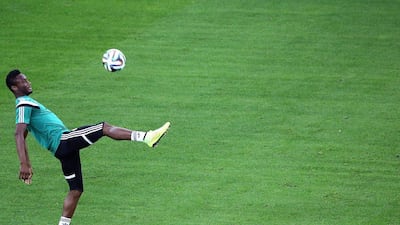Iran and Nigeria have something in common ahead of their World Cup clash in Curitiba.
When they meet Monday at the Arena da Baixada, both teams will be bidding to win their first match in the World Cup finals since France 1998. With Argentina the clear favourite in Group F, Iran and Nigeria are expected to compete with tournament newcomers Bosnia and Herzegovina for the second spot.
Click here to visit The National’s dedicated World Cup 2014 landing page
Though Nigeria are often considered a powerhouse of African football, the Super Eagles have not won a game at the World Cup finals since defeating Bulgaria in a group match 16 years ago. Since then, Nigeria have endured two fairly dismal World Cup campaigns, including in South Africa in 2010, notching a grand total of two points.
That’s not good enough for a team many have touted as the most likely to become Africa’s first-ever World Cup winner. After all, Nigeria have pedigree on the global stage, having defeated Argentina to win the Olympic gold medal in Atlanta in 1996.
The current African champions have got back on track over the past couple of years under coach Stephen Keshi, who played for Nigeria in the 1994 World Cup and has helped them recover some of the flair and power that marked his country’s football in the 1990s.
Keshi appears unconcerned that his team failed to win any of its three pre-tournament friendlies.
“My concern is how I’m going to bring my players to understand the style of play, to bring them back into the rhythm that we are used to, because it’s a long time we were apart,” Keshi said.
Keshi has a number of hugely experienced players at his disposal, many of whom play for some of Europe’s top clubs. Much could hinge on the form and fitness of Fenerbahce striker Emmanuel Emenike, who has been prolific for Nigeria since his debut in 2011.
Behind Emenike, John Obi Mikel has license to play more creatively than he does for his club side Chelsea, where he’s often a shield in front of the defence. And in goal, Keshi can call upon Lille’s Vincent Enyeama, one of the most experienced goalkeepers in the tournament.
Iran’s last victory at the World Cup was against the United States in one of the great geopolitical clashes. Their one appearance in the finals since, in Germany 2006, yielded just a solitary point.
Despite haphazard preparations that involved a dearth of friendlies and financial constraints, Iran will be no pushover. With Carlos Queiroz, a former coach of Real Madrid and Portugal, at the helm, Nigeria will find Iran difficult to break down.
To bolster the attack, Queiroz has convinced Reza Ghoochannejhad and Ashkan Dejagah to represent the country of their birth. Both played key roles in Iran’s late charge to clinch top spot in an Asian qualifying group that included regional powerhouse South Korea.
Ghoochannejhad, often known as “Gucci”, is a speedy forward who has been prolific for Iran, scoring 10 goals in 14 appearances since Queiroz convinced him in 2012 to opt for “Team Melli” rather than the Netherlands, whom he had represented at youth level. And Dejagah has similarly impressed since he opted for Iran instead of Germany.
Queiroz’s team will be led by Javad Nekounam in what is probably going to be his final World Cup. The 33-year-old is Iran’s talisman and now plays in a deeper position. Much of the team’s rhythm revolves around Nekounam, whose task is to break up opposing attacks and launch his team on the counterattack. Despite the disappointing experience in 2006, Nekounam’s experience could prove invaluable.
Follow us on Twitter @SprtNationalUAE

